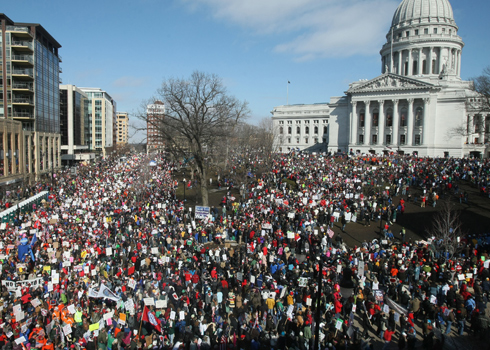Today is a big day in Wisconsin, which has been rocked by protests, legislative boycotts, ongoing recall elections, litigation and some associated chicanery, and possibly even a physical altercation at the state Supreme Court, centered around Gov. Scott Walker’s anti-public employee union legislation. After all of that…the law is now finally set to kick into effect.
Two weeks ago, when the state Supreme Court upheld the law by a 4-3 margin, against a lawsuit challenging a procedure used to pass it, it then fell to Secretary of State Doug La Follette, a Democrat, to formally publish the act in the Wisconsin State Journal, which acts as the state’s official newspaper for the purpose of giving the public official notice of new laws. This is normally to take place 10 business days after passage — though Republicans insisted it should happen immediately, after it was bottled up for three months in litigation. But instead, La Follette declared a new 10-day period, and the act is taking effect today.
As readers might recall, the law was passed in the name of fiscal austerity, requiring public employees to make greater contributions to their health care and pensions. But much more than that, it has removed most collective bargaining rights for public employees, exempting only police and firefighters. It also now requires public employee unions to win certification elections every year, with 50%-plus-one support of all eligible voting employees (not just those participating in the election), and bars automatic collection of union dues from employees’ paychecks. So overall, it is a powerful tool for the Walker administration to break the unions.
Now, in comments reported Tuesday by the Milwaukee Journal Sentinel, Walker admitted to the paper, “We had not built enough of the case” for making such a big change — a seeming admission that indeed, it had not been on the public agenda when he first came into office.
“What I should have done, from a political standpoint, was build that case sooner,” Walker added.
(jump)
Also, Walker sought to send a conciliatory message — that he never attacked teachers and other public employees:
He said other teachers asked why he was attacking them. He said he had never said anything negative about them or other public employees; the attack language came from the other side.
“Where has the polarization come from, where have the attacks come from? They haven’t come from anything we’ve said,” Walker said.
As readers shall see, that is not quite true — with the notable example of a very special phone call.
Early in the controversy, Walker and other Republicans attempted to argue that he had campaigned on such a measure as his platform. In fact, while he had campaigned on fiscal austerity and taking a harder line with the unions, he had not specifically campaigned on any proposal to absolutely strip them of their collective bargaining rights –Â as he ultimately admitted during a Congressional hearing.
This political battle made national headlines when the minority state Senate Democrats fled the state for Illinois, in order to block a three-fifths budget quorum. However, after a couple weeks the Republicans ultimately found a parliamentary maneuver to pass the bill.
(In addition, that period saw an event that will fuel anti-Walker protests for some time to come: Walker’s 20-minute phone call in late February with blogger Ian Murphy, who was posing as Republican financier David Koch. During that call, Walker discussed his ideas for tricking the Democrats into coming back by pretending to negotiate, his ambition to bust the public employee unions in the mold of President Reagan firing the air traffic controllers — an event that Walker said had led to the downfall of the Soviet Union — and that he had considered (but ruled out) planting troublemakers in the crowds of protesters.
Afterward, the legal matter that bottled up the law revolved around a key conference committee used to advance the bill — and to get around the state Senate Democrats’ walkout from the state — and whether it violated the state’s Open Meetings law by failing to give proper 24-hours notice.
In mid-March, Dane County (Madison) Judge Maryann Sumi blocked the law on these procedural grounds, issuing a temporary restraining order on the grounds the plaintiff, the Dane County District Attorney Ismael Ozanne (D), had a likelihood of success in his complaint.
The Walker administration then made multiple attempts to disregard the ruling and implement the law anyway, before ultimately backing down in the face of repeated orders.
Finally, Sumi’s decision was overturned by the state Supreme Court — in heated discussions amongst themselves that left liberal Justice Ann Walsh Bradley accusing conservative Justice David Prosser of grabbing her neck in a chokehold. The matter is currently under investigation.
Besides any possible physical fights, the political fights are far from over. A wave of state legislative recalls have come over the state, with Democrats attempting to pick up a net three seats in the state Senate and thus win a majority in the chamber. This July and August there will be a total of nine recalls, targeting six Republican incumbents and three Democrats.
That won’t be the end of it, either – Democrats have also publicly vowed to recall Walker next year, after the one-year grace period that shields an elected official from being recalled early in their term has expired.






